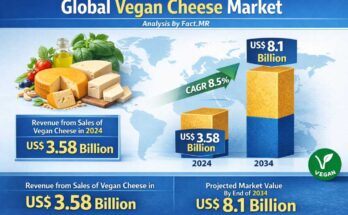Sustainability and resource efficiency have emerged as crucial priorities across industries, and the upcycled ingredients market is gaining significant attention as a solution to food waste and environmental challenges. Upcycled ingredients are derived from surplus or by-products that would otherwise go to waste, providing functional, nutritious, and sustainable alternatives for food, beverages, and personal care products. The increasing consumer demand for eco-friendly, ethical, and high-quality products is catalyzing the adoption of upcycled ingredients across multiple sectors.
Market Overview
Upcycled ingredients encompass a variety of materials, including fruit and vegetable pulps, spent grains, whey, coffee grounds, and other by-products, which are reprocessed to create value-added products. These ingredients retain their nutritional profile while reducing environmental impact, aligning with the principles of circular economy and zero-waste initiatives.
The market growth is strongly influenced by consumer preference for products that are both sustainable and beneficial for health. Manufacturers are integrating upcycled ingredients into snacks, beverages, nutritional supplements, bakery items, and even personal care products such as soaps and skincare formulations. This approach not only contributes to waste reduction but also provides brands with an opportunity to differentiate themselves in an increasingly conscious marketplace.
Technological innovations, such as advanced extraction methods, fermentation, and formulation optimization, are enhancing the quality, flavor, and functionality of upcycled ingredients. This enables industries to create products that meet consumer expectations for taste, performance, and sustainability without compromising quality.
Regional Insights
The adoption of upcycled ingredients varies across regions, driven by local consumer trends, industrial infrastructure, and regulatory frameworks.
North America is a leading region in the adoption of upcycled ingredients, largely due to heightened consumer awareness of sustainability and active support for waste reduction initiatives. Food and beverage companies are increasingly leveraging upcycled ingredients to meet both environmental and nutritional goals.
Europe closely follows, driven by stringent regulations on food waste, environmental protection, and the promotion of circular economy practices. Countries across Western Europe are witnessing rapid growth in startups and established companies focusing on upcycled food and personal care products. Regulatory incentives and consumer demand for ethical products are further encouraging the use of sustainable ingredients.
Asia-Pacific is emerging as a significant market, with increasing awareness of sustainable practices among urban consumers and growing adoption of innovative food processing technologies. The region’s expanding food, beverage, and personal care industries are gradually incorporating upcycled ingredients into mainstream product lines.
Other regions, including Latin America and the Middle East & Africa, are gradually exploring opportunities in the upcycled ingredients space. Initiatives to reduce food waste, combined with investment in research and processing technologies, are paving the way for the growth of sustainable ingredient solutions in these markets.
Key Trends & Forecast
The upcycled ingredients market is evolving rapidly under the influence of several key trends:
- Sustainability and Waste Reduction: Increasing pressure on industries to reduce food waste and adopt circular economy principles is driving the demand for upcycled ingredients.
- Health and Functional Benefits: Upcycled ingredients offer nutritional advantages, such as high fiber, protein, or antioxidants, which are appealing in health-conscious product formulations.
- Innovation in Food and Beverage Products: Companies are exploring new ways to integrate upcycled ingredients into snacks, beverages, bakery items, and supplements, enhancing both functionality and appeal.
- Personal Care Applications: Upcycled plant-based materials and extracts are increasingly used in soaps, skincare, and cosmetic formulations, supporting eco-conscious product positioning.
- Collaborations and Partnerships: Collaboration between food producers, ingredient suppliers, and sustainability-focused organizations is strengthening the supply chain for upcycled ingredients.
- Consumer Awareness and Labeling: Transparent labeling and storytelling about upcycled ingredients are helping brands build trust and educate consumers on the environmental benefits of their products.
These trends highlight how the market is transitioning from niche applications to becoming a mainstream component of sustainable food and personal care industries.
Applications & End-Use Outlook
Upcycled ingredients find applications across diverse industries that prioritize sustainability, nutrition, and innovation:
- Food & Beverages: Snacks, bakery products, beverages, and nutritional bars are incorporating upcycled ingredients to enhance flavor, texture, and nutritional content.
- Personal Care and Cosmetics: Skincare, haircare, and soap products utilize plant-based upcycled extracts for antioxidant, moisturizing, and cleansing properties.
- Nutritional Supplements: Protein powders, fiber supplements, and functional foods benefit from high-value upcycled ingredients derived from plant and dairy by-products.
- Animal Feed: Certain upcycled ingredients are repurposed for livestock and pet nutrition, contributing to waste reduction in agricultural sectors.
- Industrial Applications: Specialty food additives, flavor enhancers, and texturizing agents made from upcycled materials are finding use in manufacturing processes.
The adoption of upcycled ingredients across these applications demonstrates their versatility and growing relevance in sustainable product innovation. By integrating upcycled materials, manufacturers are able to enhance product differentiation, align with environmental responsibility goals, and appeal to increasingly conscious consumers.
Conclusion
The upcycled ingredients market represents a transformative opportunity for industries aiming to reduce waste, embrace sustainability, and deliver high-quality products. By converting surplus materials and by-products into valuable ingredients, companies can foster circular economy practices while meeting consumer demand for nutritious, safe, and environmentally responsible offerings.
As global awareness of sustainability and eco-conscious consumer behavior grows, the adoption of upcycled ingredients is expected to expand across regions and applications. For companies operating in the food, beverage, and personal care sectors, embracing these ingredients is not only a strategy for innovation but also a commitment to environmental stewardship and long-term business resilience.
Upcycled ingredients are more than a solution to waste — they are a pathway toward sustainable growth, innovation, and responsible consumption in today’s competitive marketplace.
Browse Full Report – https://www.factmr.com/report/upcycled-ingredients-market



